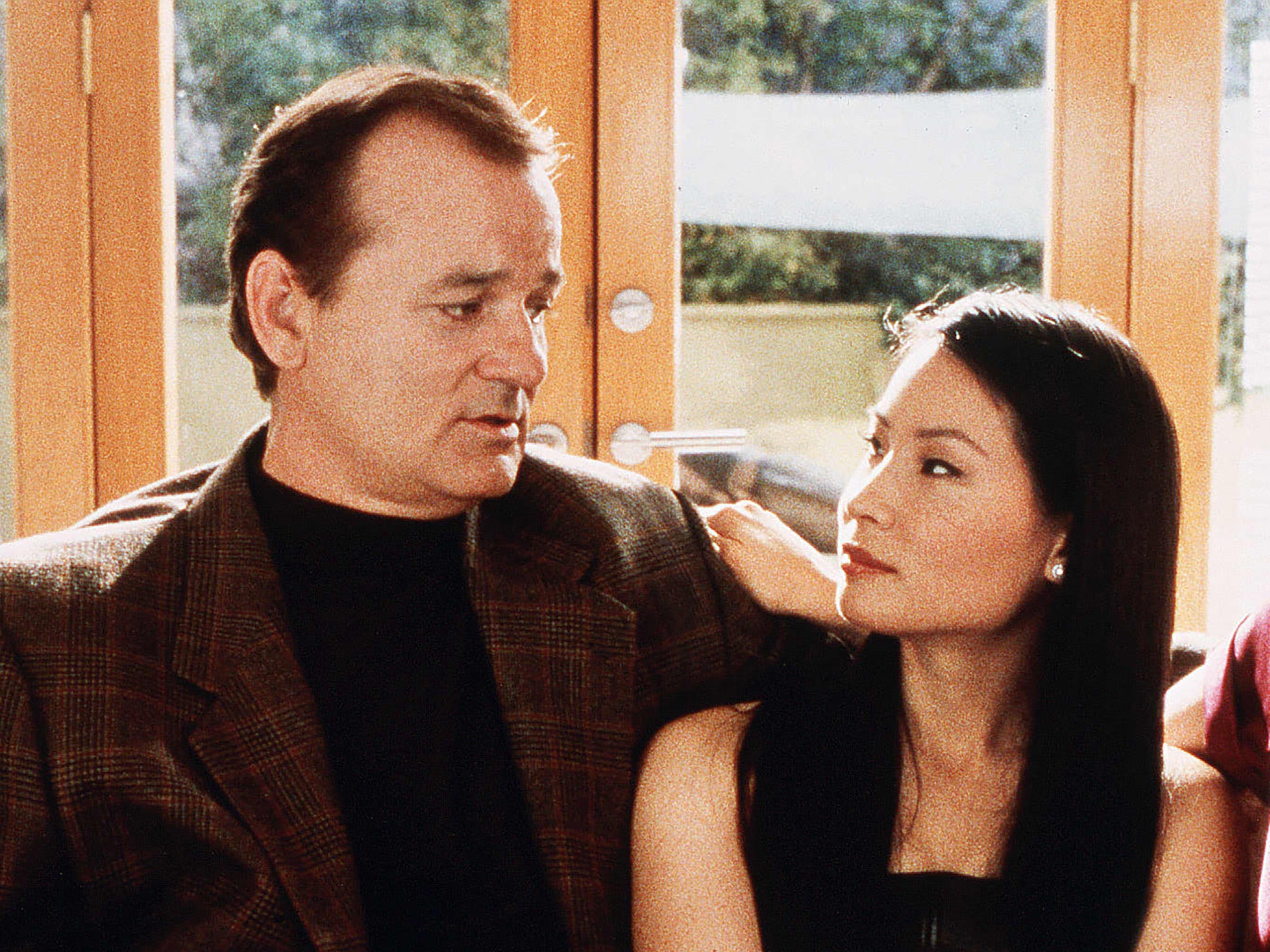The Independent's journalism is supported by our readers. When you purchase through links on our site, we may earn commission.
Bill Murray’s fight with Lucy Liu proves that not all our heroes are nice people
The ‘Groundhog Day’ star has become a mythical figure of quirk despite clashes with many of his co-stars. By ignoring the feuds, we do a disservice to a complicated and brilliant man, writes Adam White


For a long time, everyone loved Bill Murray. This was the guy who rocked up to a student party in Scotland and did the dishes; who drunkenly crashed a stolen golf cart in Stockholm; who stole chips from strangers’ plates with the parting words: “No one will ever believe you.” He was the human equivalent of a pizza passed around a party – what kind of monster would turn their nose up at it? But as much as we like to revel in the folklore of Bill Murray, some who’ve worked with him have encountered a very different man.
There are enough people who’ve had run-ins with Murray to fill a rolodex: Lucy Liu; Richard Dreyfuss; Anjelica Huston; Sean Young; the late, great Harold Ramis. Murray is so prolifically tricky to work with that Ghostbusters writer and star Dan Aykroyd dubbed him “the Murricane”. He is said to be prone to mood swings so volatile that it’s sometimes impossible to share a scene with him. All of which leaves those who love his work in a bit of a quandary: is it still OK to idolise a movie star whom so many people can’t stand?
One of Murray’s most notorious feuds has resurfaced again in recent months, with Liu and Drew Barrymore both discussing the actor’s alleged misbehaviour on the set of Charlie’s Angels (2000), the secretly avant-garde film version of the classic TV show. Murray played Bosley, the exasperated intermediary connecting detective agency owner Charlie with his crime-fighting angels (Liu, Barrymore and Cameron Diaz). If you ever wondered why Murray didn’t return for the 2003 sequel Full Throttle – where he was replaced by Bernie Mac – it was probably due to his clashes with Liu on the set of the first film.
In July, Liu told the Asian Enough podcast that Murray began “hurling insults” at her during the filming of a scene. “Some of the language was inexcusable and unacceptable, and I was not going to just sit there and take it,” she said. “So, yes, I stood up for myself, and I don’t regret it. Because no matter how low on the totem pole you may be or wherever you came from, there’s no need to condescend or to put other people down. And I would not stand down, and nor should I have.”
Earlier this week, Barrymore backed up Liu’s claims on her US talk show, recalling: “What really happened was Bill was just in a – you know, comedians can be a little dark sometimes – and he just came in in a bad mood. What you have to know is how much Lucy stood up for herself and that was the great thing that came out of an unfortunate circumstance. She literally said, ‘I do not accept that kind of behaviour from you.’ And we all supported her and backed her up and we moved forward.”
Murray has never explicitly denied the interaction occurred – he’s also never commented on Charlie’s Angels director McG’s claim that he headbutted him on the set – but he did tell The Sunday Times in 2009 that he would happily “dismiss you completely if you are unprofessional and working with me”, adding: “When our relationship is professional, and you’re not getting that done, forget it.”
One of the most painful aspects to these tales of off-camera woe is that Murray is so cosy as a movie star. In films like Ghostbusters, Groundhog Day and Lost in Translation, he can be slick and curmudgeonly, but also avuncular. You want to give him a hug or put him in your pocket. It’s partly the Wes Anderson effect, too. Thanks to his roles in The Royal Tenenbaums, The Life Aquatic with Steve Zissou and any number of Anderson films, Murray has the air of someone who belongs in a children’s picture-book – a totem of grumpy goodness who shows up at parties he wasn’t invited to and gives everyone a story they tell and retell for life.
That he doesn’t actually fit into all of that good-natured mythology – and can be an absolute jerk to people who don’t warrant that kind of treatment – exposes the perils of treating famous people as heroes. To build up that image of Murray, we’ve had to sand down many of his edges, or pretend they don’t exist. And by doing that, we create an un-nuanced and slightly backwards impression of him, and diminish the experiences of those who’ve struggled to work with him.
Everyone can still love Bill Murray. He’s consistently a pleasure to see in things and acts unlike anyone else in Hollywood. He has a sort of slack and pithy detachment on-screen that would typically be unbearable, yet somehow Murray gets away with it. But it’s unfair to him and people like Liu to not acknowledge the full picture of the man, of someone who is funny and brilliant and also fallible. They say never meet your heroes, but the truth is actually a bit more messy: meet them, sure, but don’t assume they’d ever live up to what we want from them.
Join our commenting forum
Join thought-provoking conversations, follow other Independent readers and see their replies
Comments


Bookmark popover
Removed from bookmarks